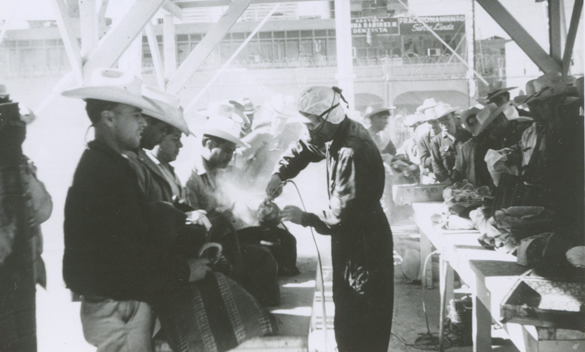“Harvest of Loneliness (Cosecha Triste),” a documentary co-directed by Vivian Price, professor of interdisciplinary studies and coordinator of the labor studies program at California State University, Dominguez Hills, will be aired on PBS stations throughout the country in September and October. In the film, Price and Gilbert Gonzalez, professor emeritus of Chicana/o studies at UC Irvine, examine what was known as the bracero program, which recruited Mexican laborers for temporary work in the United States from 1942 to 1964.
Price says that it has been “thrilling” to be able to share the history of the braceros, whose experience is virtually unknown in the United States.

“So many students have thanked us because they have former braceros in their families,” she says. “Especially as the scapegoating of immigrants escalates, it’s important for people to understand that the migration of Mexican workers has its roots in a program initiated by the [U.S.] government, catering to the interests of the large growers.
“Globalization policies like NAFTA continue to create starvation conditions in Mexico and Central America, driving people into the U.S. to work under brutal conditions for low wages,” Price continues. “Our film provides context for the issues of immigrant justice and labor rights, the prospect of a new guest worker program, and even the importance of teaching ethnic studies.”
The history of the bracero program, which was seen as a deterrent to union organizing, is presented through archival footage and interviews with surviving braceros and their family members. Their interviews provide an eyewitness look at a labor program that not only did not meet up to the expectations of humane treatment and working conditions for its workers, but that also damaged familial relationships with those left back home in Mexico.
Price says that the title, “Harvest of Loneliness,” captures the pain experienced by the braceros and their families through separation by economic necessity. She notes that the promise of equitable working conditions and the ability to improve the lives of families back home in Mexico more often than not resulted in even more financial burden from the debts incurred to send the men to the U.S. in the first place.
“We interviewed women who spoke of the difficulty of surviving without their husbands in Mexico, supporting their children alone, often not knowing where their husband was or when they would see him again,” says Price. “We spoke to the children of braceros who wept while they told us about how often they saw their mothers cry. What was also devastating to see was that many of the former braceros themselves broke down and cried while they were telling us about their experiences, the way they were treated, and the loneliness of their lives [while] separated from their families.”
“Harvest of Loneliness,” which has been screened at numerous universities including CSU Los Angeles, UCLA, and Berkeley, received the Cinelatino Audience Choice Award for Best Documentary at the 2010 Los Angeles Latino Film Festival and a Van Gogh Award for Best Educational Film Award at the 2011 Amsterdam Film Festival last May. The PBS screenings of “Harvest” are supported in part by two Sally Casanova Memorial Research, Scholarship and Creative Activities Program (RSCAAP) mini-grants that Price received from CSU Dominguez Hills.
Price, who has organized the annual Labor and Social Justice Fair at CSU Dominguez Hills since 2009, says that she hopes that “Harvest of Loneliness” sends audiences a timely message about the need for labor reform today.
“Workers who are trying to get fair wages, benefits, decent working conditions are often thwarted in their attempts to unionize by the difficulty in getting a union election, as employers have many ways of intimidating workers and using delaying tactics,” says Price. “Employers often successfully use nationality, race, and gender differences to polarize workers, and to turn American citizens against undocumented workers.
“Unions in general are being blamed for the plunging government treasuries, making it all the more important for the public to consider the way corporations are diverting attention away from their rising profits, while the wages and benefits of working people are being decimated, in the private and even in the public sector. The labor movement is a key force in our democracy to bring unity and dignity to all workers.”
“Harvest of Loneliness” will air on the following PBS stations in September and October. These times and dates are available at press time, please check local listings for any changes:
KQED, San Francisco – Sept. 3, 5 p.m.; Sept. 21, 9 a.m., 12 p.m.
WTVS, Detroit – Sept. 4, 3 p.m.
KPBS, San Diego – Sept. 5, 10 p.m.
KRCB, Sonoma, County – Sept. 13, 9 p.m.
KCET, Los Angeles – Sept. 15, 9:30 p.m.
KOCE, Orange County – Sept. 18, 5 p.m.
WMVT Milwaukee – Sept. 18, 11 p.m.
KOCE, The OC – Sept. 20, 1 p.m.; Sept. 27, 10 p.m.
WSIU-HD, Carbondale, Ill. and WUSI-HD, Olney, Ill. – Sept 21, 11 p.m.
WHUT-HD, Washington D.C. – Sept 24, 10 p.m.; Sept. 25, 2 a.m.
KLCS, Los Angeles – Sept. 25, 10 p.m.; Oct. 4, 10 p.m.
KSPS-TV, Spokane – Oct. 2, 2 p.m.
Nebraska ETV – Oct. 5, 9 a.m.
AOL TV, Johnson City, Tenn.; KCTS 9, Seattle – Oct. 6, 10 p.m.; Oct. 9, 2 a.m.
KAET Eight, Phoenix; WVPT, Harrisburg, Va; WXEL, West Palm Beach, Fla.; WXXI, Rochester, NY; Louisiana Public Television – check local listings
For more information on “Harvest of Loneliness,” visit the film’s Website.